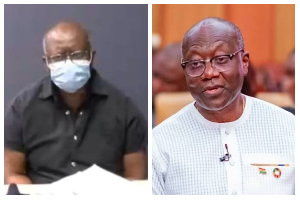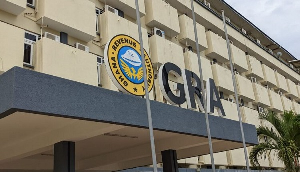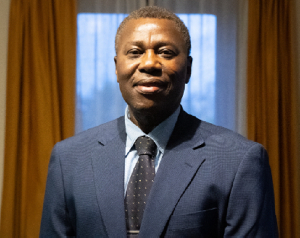The recent protest by the Ghana Muslim Students' Association (GMSA) is a clear indication that all is not well with the education system in the country. I mean, what should be the issue in Ghana today is not religious devotion in schools but how to improve the quality of education and learning. It is not whether students start the day with christian or muslim prayers, but whether they are acquiring cutting edge knowledge, skills and ideas needed for the 21st century.
In any case, the government of Ghana needs to take urgent steps and nip this simmering problem and tension in the bud - the controversy over the forced participation of muslims in christian morning devotions in schools. The GMSA is clearly set on a collision course with the Ghana Education Service (GES) because it has urged all muslim students to reject the directive from the GES to attend the morning devotion- a christian morning devotion. This development is not good for inter-religious harmony in the country
According to the president of the association, the directive from the GES is discriminatory and unfair. It violates the rights of muslim students. Muslim students should not be compelled to participate in christian devotions. The president of GMSA further pointed out that directing muslim students to take part in compulsory morning devotion was redundant because, according to him, the students do their morning devotion as early as 5.00 am and since they do not compel christian students to join them for the muslim morning prayers, muslim students should not be made to join in the christian morning devotion that takes place much later in schools.
He said
"We go for morning devotion every day. We have our Fajr which start(sic) at 5 am We don't ask people to come and join us. So why should we [join in Christian prayers] after praying aside. In some circumstances [their prayers] clash with the time of our prayers and students are made to abandon the Islamic worship and attend church services. Is that fair?,"
Yes it is unfair to force muslims to pray in a christian way. Just as it is unfair to force non muslims to pray in a muslim way or to compel non religious people to say religious prayers or force persons who do not want to pray to do so. The business of a school is not to get people to pray. Is it?
I do not think that the response of the Public Relations Officer of the GES did justice to the matter. He said that the compulsory christian morning devotion in schools had nothing to do with converting muslim students to christianity. Really? He said that it was a way of bringing the students together to worship and to realize national unity. He did not elaborate on how compelling muslim students to pray in a christian way would bring national unity. I mean what has saying christian, not Ga traditional prayers, in schools got to do with the national unity of Ghana? And now the situation has taken this dimension, is participating in christian morning devotion fostering unity or disunity?
But the most important thing now is : What is the way forward for Ghana?.
First of all I must make a distinction between private and state schools. What I am going to say here applies only to state schools. These are schools which are funded with state money, not monies from individuals or private organisations. Like in other countries in sub saharan Africa, the educational system in Ghana is tied to christianity because christian missionaries first introduced this formal education system. The schools have a 'tradition' of organizing christian morning devotions because the schools were used to evangelize and win converts.
So the PRO of Ghana Education Service should not tell us that the compulsory morning devotion has nothing to do with converting the students to christianity. It has. History tells us so. Common experience testifies to that. Many people who first professed christianity converted in the course of their education in christian schools.
But there is a more fundamental challenge facing the managers of state schools in the region. The post independent African governments continue to run and manage missionary schools in ways that overtly discriminates against non christians. This has made muslim groups to introduce their own schools in addition to their Madrasas. And they manage the schools in ways that discriminate against non muslims. What is going on in the school system in Ghana and in other countries in the region is actually a religious competition for domination.
Post colonial African state authorities have not broken the tie or abandoned the tradition of christian or muslim devotions in schools. They have been reluctant to operating an inclusive, religiously neutral school system that does not discriminate against students on grounds of religious belief or unbelief.
The time has come for GES to take urgent steps towards achieving an inclusive educational system. An inclusive school system is actually what will being national unity to Ghana not a mandatory christian or muslim morning devotion.
To this end the government of Ghana must take measures to keep churches/mosques and schools separate. Today in Ghana, education and religious devotion- christian or muslim- mix. And this is hurting Ghana's school system. This is undermining peace and harmony. Compulsory christian morning devotion takes place in some schools in Ghana. While compulsory islamic morning devotions are organised in others particularly in the state funded 'muslim' schools across the North. If the GMSA thinks that compulsory christian devotion is discriminatory and unfair to muslims, it should also understand that compulsory muslim prayers in government schools is discriminatory too.
To be just and fair to students of all religious and non religious backgrounds in Ghana, the compulsory religious- christian or muslim- devotion in schools should cease and be replaced by an inclusive moral instruction program based on human values and decencies like love, kindness, honesty, tolerance for one another, respect for human rights, justice and fairness, etc. This moral instruction should be organised in a way that is not discriminatory to anyone. The government of Ghana should consider adopting this moral education policy without delay. The GES should make it clear that government funded schools are established for learning purposes not for praying and evangelizing. Government schools are not missionary schools and therefore should not have religious programs that discriminate against students of a particular faith or none.
Schools are meant for education not for religious devotion, for the acquisition of knowledge and ideas, the inculcation thinking skills not for the propagation of religious dogmas.
The government of Ghana should take urgent steps and separate education and religious devotion now!
Opinions of Tuesday, 3 March 2015
Columnist: Igwe, Leo














